At 83, America's beloved farmer-philosopher still has plenty to say about how our disregard for the past points us in a destructive direction.
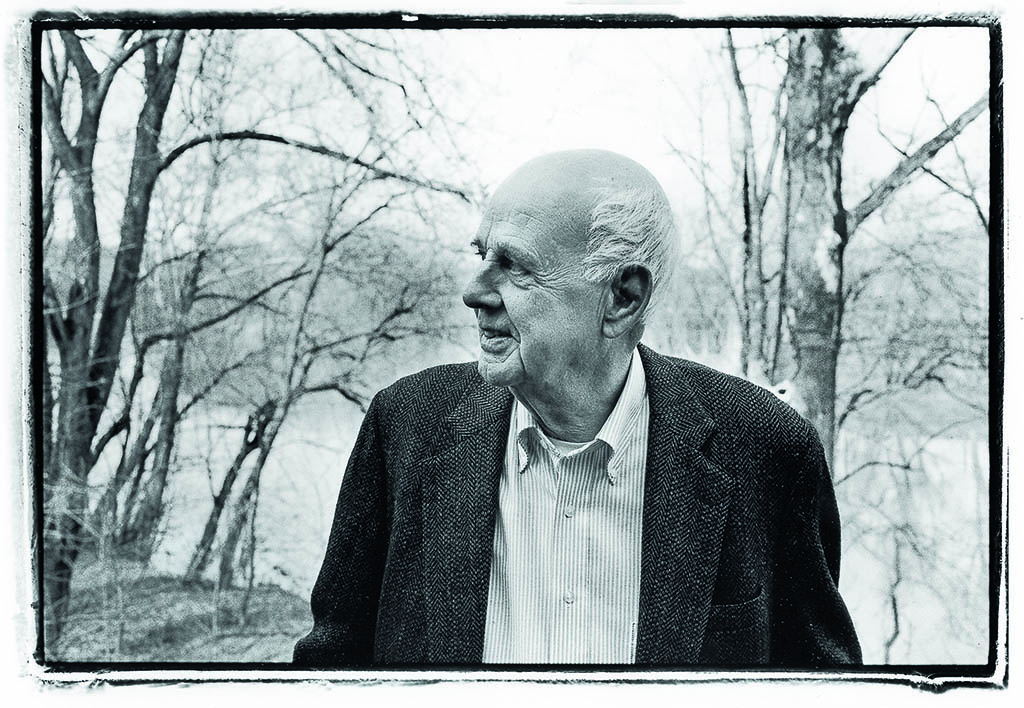
WENDELL BERRY CELEBRATED his 83rd birthday in August. He is old. But not so old that he can’t kick and spit and fight every force that threatens to destroy his way of life and, thus, his worldview. “What I stand for is what I stand on,” the seventh-generation Kentucky farmer and urgently prolific scribe wrote in 1980. And, indeed, Berry returns again and again to his hometown of Port Royal (Port William in his fiction). By pledging allegiance to all things local, he has brought global attention to the plight of fragile rural economies and the importance of sustainable agriculture.
In his latest book, The Art of Loading Brush: New Agrarian Writings (available in November from Counterpoint), Berry continues to rage against machines: the laptops and high-tech tractors he believes are causing us to lose touch with each other and our environments. He laments the “dispersed lives of dispersed individuals, commuting and consuming, scattering in every direction every morning, returning at night only to their screens and carryout meals.”
Yes, Berry’s a bit of a curmudgeon, who likens our smartphone obsession to drug addiction and prefers horse-drawn plows to simulated horsepower. He writes longhand before his wife, Tanya, converts the manuscripts on a Royal Standard typewriter. Such anachronistic tendencies, however, point to more than mere nostalgia – namely, a clear-eyed view of the ways in which modern society is wrecking the Earth under the guise of progress. As the journalist David Skinner noted in 2012, “Instead of being at odds with his conscience, he is at odds with his times.”
God willing, the times may have finally swung back around to meet the man. Though Berry would no doubt heap scorn upon today’s $8 heirloom tomatoes and $200 farm-to-table dinners, he did participate in the new documentary Look & See: A Portrait of Wendell Berry, produced by Robert Redford and Nick Offerman. The reluctant subject never shows his face in the film; rather, he shares selections from his work in powerful low-pitched voiceovers. (Visit lookandseefilm.com for information on how to host a screening.) Not coincidentally, the rare photographs on these pages were captured by his intimates: former students and dear friends.
Now, with The Art of Loading Brush, he offers a mix of essays, short stories, and poetry, including the following poem, “What Passes, What Remains.” Part of the author’s Sabbaths series, inspired by long Sunday walks around his Lanes Landing Farm, the verses employ a fictional Port William family, the Rowanberrys, to unfold Berry’s thoughts on mortality and the often heartbreaking ways humans shape the land, and vice versa, over the course of generations.
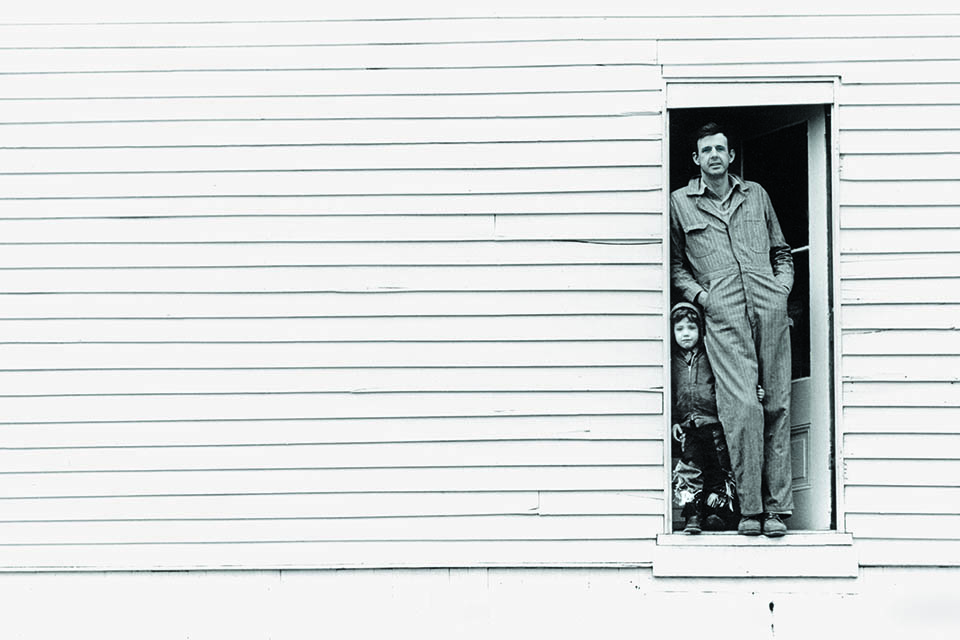
Wendell Berry’s friend – photographer and former Kentucky Poet Laureate James Baker Hall – snapped this portrait of the writer with his son, Den, in the mid-1960s. Den, now 55, and his sister, 59-year-old Mary, represent the eighth generation of their family to farm in Henry County, KY.
{ from Sabbaths 2016”“VIII }
What Passes,What Remains
Here the mingling of the waters
of Shade Branch, Sand Ripple,
the dishonored Kentucky River,
tells the history of our country
which is the history of our people.
Here the mind submits
itself to be shaped, and so
it shapes its thought, partly
of itself, partly of all
in time it has come to know.
Here in this passage of valley
hollowed by the passage of water,
great Life has come in passing
to inhabit every body
inhabiting this place,
giving desire and motion,
giving sight, light,
color, and form, giving
stories, songs, calls,
cries, outcries. How long?
This is the place in which
the living live in the absence
of all who once were here,
their stories kept a while
in memories soon to be gone
the way of the untongued stories
preceding ours, reduced
to graves mostly lost
and a few found strayed
artifacts of stone.
Of those now living here
already few recall
the names of the Rowanberrys
whose home this rough land was
that bears in presence only
their worn ways, some scars
their work made, the well
the early ones dug and walled
where their log house stood
and burned, the disassembled
chimneys, the sundered hearths.
Their numberless disappeared
footsteps are traceable now
only by the remaining few
who remember the last of them.
By love we keep them with us,
and so we have remembered
ourselves as members, gathered
in Love’s household that stands
surpassingly in time: we few
remaining, who keep the stories.
“My lord, they worked hard
for every nickel and dime
they ever had. One crop
finished and gone to market,
they’d start clearing a patch
of hillside for the next crop.
If you look about, you’ll find
their monuments that will last, I reckon,
clean to Judgment Day:
big piles or squared cairns
of rocks turned up by their plows,
dragged out of the furrows,
lifted and put down, and nothing
automatic into it, neither.
Here and there you’ll find
their gullies too, mostly healed
under the young woods about
the age of an old man.”
“I was grubbing bushes
and sprouts with an axe, setting
my own pace, but hard at it.
Art and Mart were felling
and logging up the trees
with a two-man crosscut saw.
After while Mart said, ‘Pascal,
I’ll rest you a little. Let me
run that axe, and you
get here on the saw with Art.’
So we traded, and good God!
I felt like I had a hold
of the tail of a stout big calf
and couldn’t turn loose. Even
what they called rest was work.
And Mr. Early Rowanberry
– the old man, but not so old
then as I thought – he
would be working always, always
somewhere ahead of them.”
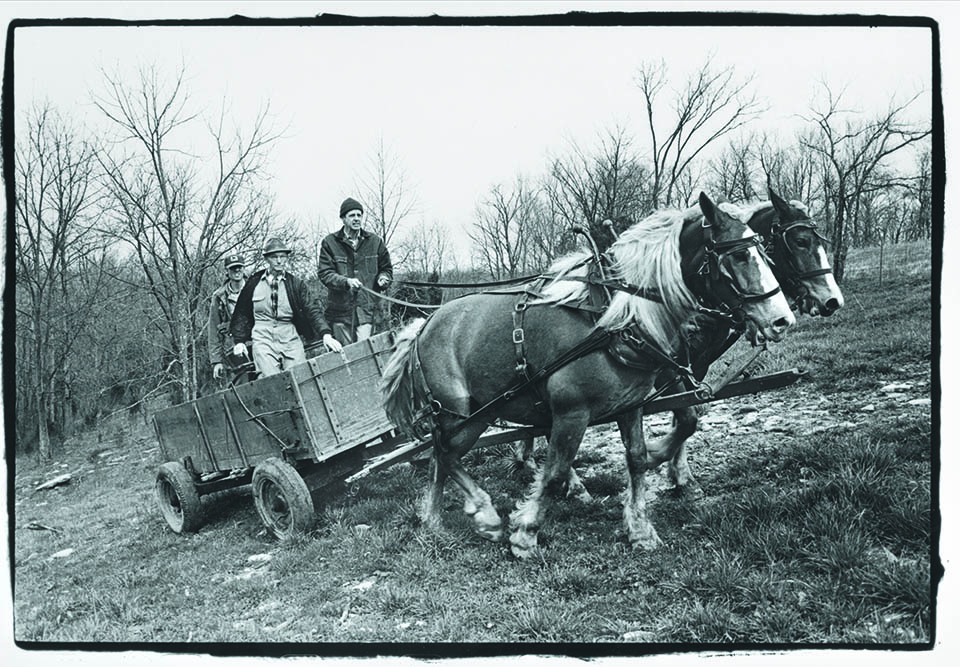
Berry eschews modern tractors in favor of draft horses, which he has employed for plowing, hauling firewood, and, on this 1960s occasion, taking neighbors for a ride.
“He come in there at Burgess’s
one evening late, a bunch
of us loafing there, talking,
the way we’d do. He bought
a steel-beam rounder plow,
paid in cash, and then
did what not a one of us
foresaw. He’d come walking.
It was a heavy plow. Somebody
would have hauled it down there
for him in a day or two.
He picked it up by the beam of it
and laid it over his shoulder
like it wasn’t more than a hoe,
hunched it into place,
and set off home on the path
down Shade Branch, a mile
to walk and it getting dark.
Lord amighty! Hurrying
to be ready to work in the morning,
I reckon. No time to lose.”
“Oh, it hurts me to remember
how hard my daddy worked.”
And she by then was old
after a life of her own
hard work, hers and Pascal’s,
by which they bought, paid for,
and improved their farm, built
and paid for a good small house.
Theirs had been a time
kinder to them than her father’s
had been to him. Their life
even so had been in its way
a triumph of work and thrift,
care and self-respect.
Whoever knew them knew
something inarguably good.
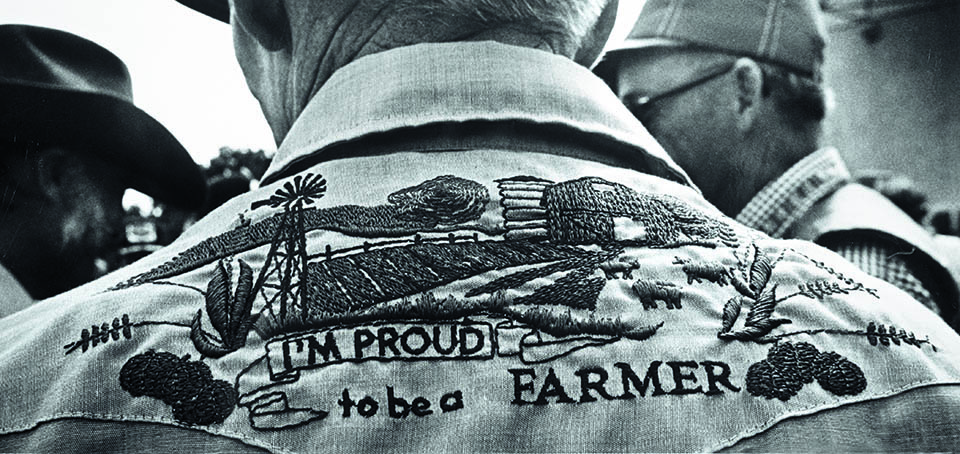
Photographer David Peterson accompanied Berry to an Omaha rally in August 1986, amid the “farm crisis” that pushed many small producers into foreclosure. The embroidered message on this protester’s shirt says it all.
“A while after we got married
and set up housekeeping
over across the river,
knowing she missed her folks,
I brought Sudie back home
for a visit late that winter.
It sleeted during the night.
In the morning all outdoors
was coated with ice. They’d been
cleaning up another
hillside for another crop:
felling the trees, grubbing
out the bushes, closing in
on a great big snarl of briars
still in the way. After
breakfast, Mr. Rowanberry
sent us boys to the barn,
slipping and sliding on the ice,
to do the chores. And he
took down his scythe from its nail
and went to the hillside to mow
that big blackberry patch
before the day warmed up
and melted off the ice
from the catclaws of the briars.”
And so some days they were favored,
when place and work and weather
seemed to answer one another,
when what the world asked
and what they gave seemed
almost in rhyme, hour
after hour, daylight to dark,
days too when the world asked
for all they had to give
and more, when a boy, under
the demand of a father, brittled
and driven, could wish to be
some place he could not go.
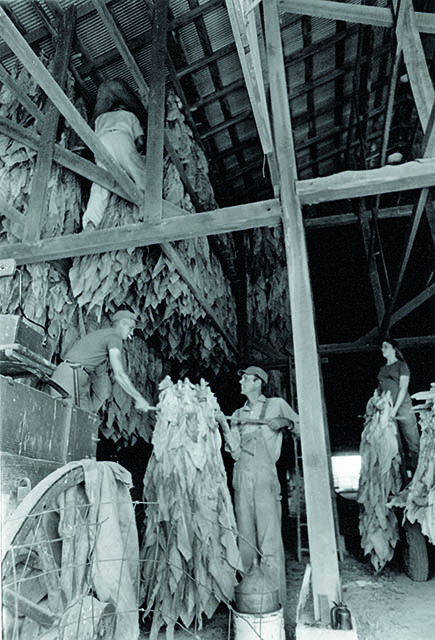
During the 1973 tobacco harvest, Berry (center) and his daughter, Mary (right), help hang freshly picked leaves to dry at their neighbor Loyce Flood’s farm.
“My daddy remembered Art Rowanberry
disking ground with a team of mules
when he wasn’t more than eight years old.
His feet didn’t reach to the frame of the harrow,
and his daddy had tied him onto the seat
with a little piece of cotton rope.
He was all the help his daddy had.
I don’t reckon Art remembered
when he didn’t know how to drive a team.”
“Art enlisted in the army in ’42
when he was thirty-seven years old.
In basic training he rested up.
He said he gained a little weight.”
“To stand around waiting to work,
that was something I had to learn.
One day they give us out some axes,
thick as your foot, dull as a froe.
I taken a file and whetted mine
to where it was some account. Them boys
just stood around and watched me chop.”
“He was the oldest, the eldest son.
He thought if he went, the younger ones
would be spared. But they drafted two of them.
If he hadn’t enlisted, Art might not
have had to go. But oh my!
He saw a world he’d never dreamed of,
and dreamed of, I reckon, the rest of his life.”
“I stopped in Bastogne with a buddy of mine
and we bought us a big plate of potatoes.
We still were eating them when the Germans
cut us off. Before that was done with
we needed a big plate of potatoes.
We was hungry, down to just
one little pancake a day.”
I said, “I reckon you all were glad
when they broke through and got you out.”
And he said, seeming to look and see it
again through almost forty years,
“We was glad to see that day when it come.”
“It was during the war, I reckon.
I don’t remember why,
but I was mowing weeds
with an old machine we had
and my good team of mules.
The weeds was tall as the mules
and it was smothering hot,
punishing hot, the air
flying full of chaff
and biting flies. And that
old leftover machine,
you had to run it fast
to make it cut atall.
I hit a stump and broke
the cutter bar clean off.
I never was as glad
of anything in my life”
– Mart.
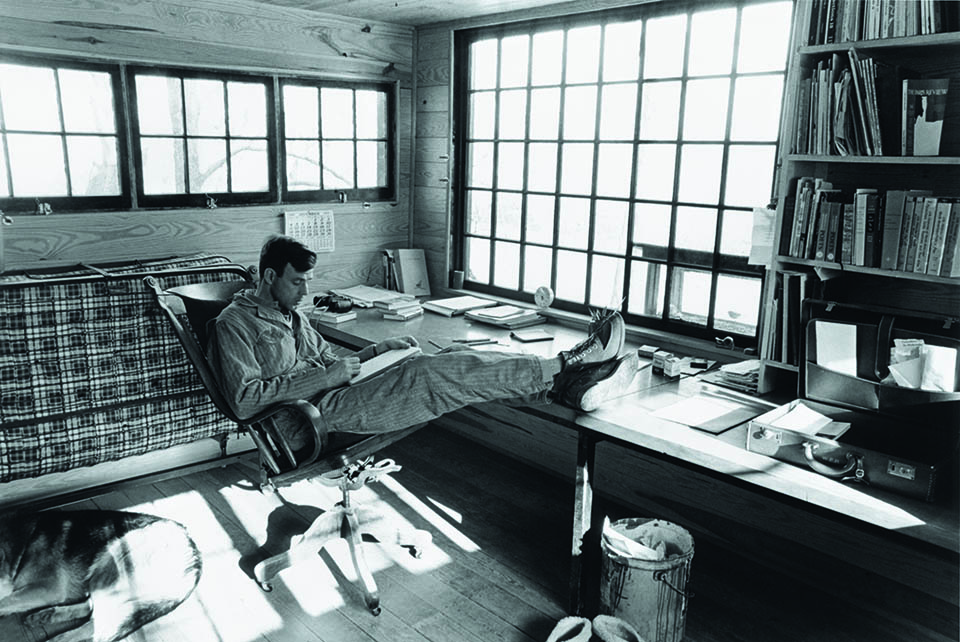
This 1966 shot captures Berry at his writing desk, which sits in front of the 40-pane window that sparked his Window Poems. It also inspired the title of the recent documentary Look & See.
Or any of them,
at work in the hot sun,
might have looked into the woods
at the trees standing in shade
at ease and quiet, and thought
again that man must earn
his bread by the sweat of his face.
Mart, who here stands
imperfect as he knew he was,
was rightly somewhat glad
that when the Reckoning came
and he stood before his Maker
he would at least have met
the terms of our condition, discharged
his debt, his account of sweat
and labor paid in full.
At last, when we’d worked together,
through the morning, and Flora
asked, as we came into the kitchen
for dinner, glad to see him
as she always was, “How’re you,
Art?” Art said, “Well,
they say you’re once a man
and twice a child, and I believe
I’ve been through just about
all them possibilities.”
Now they and all their days
are gone into the silence
and invisibility that come
with an old man’s gathered years
to hover over the home,
the known, land. None
like them will ever live
in such a time as theirs
in such a place as this
place was in their time.
Eternal in its passing, Life
came to them, offering its gifts,
making its demands, and they
answered by their work, their pleasure,
their enduring, knowing at times
a timelessness in which
they woke as living souls.
To one who has watched and remembered,
listened and remembered, in time
sharing the work and the weather,
the laughter and the grief, it seems
that Life is with us always
as a wide wind passing
through the woods, moving
moving every leaf. As it gives us
our lives and then, as we
have made them, takes them away,
a fitting care remains
as ever still and whole
in our great Taskmaster’s eye.
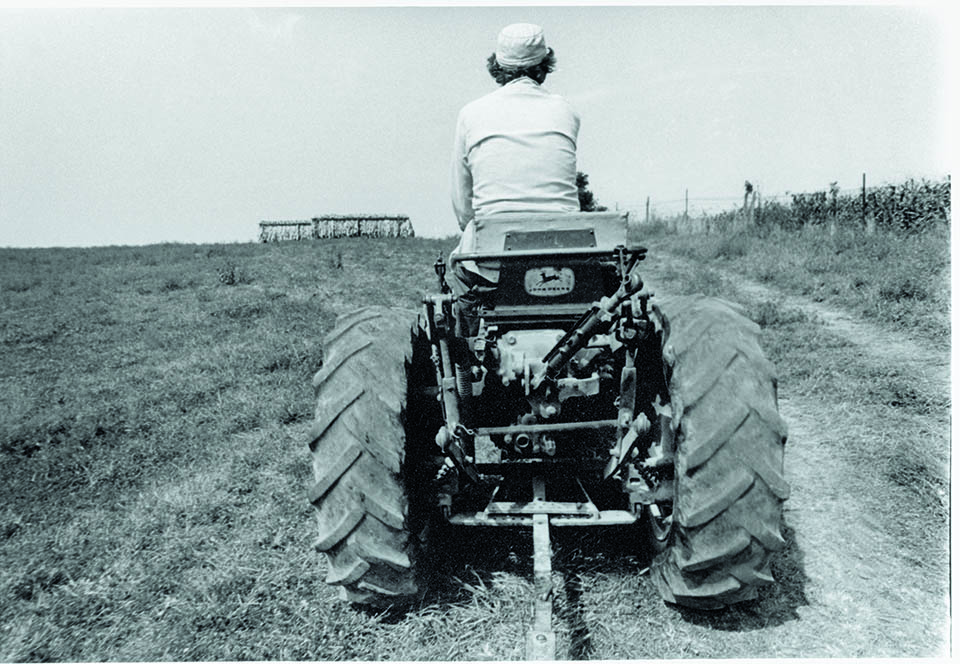
Berry’s neighbor Loyce Flood rides into her tobacco fields in 1973.
I was recently in Louisville, Kentucky where I lived until the age of 28. I have lived in Buffalo, NY since and now am 77 years old.
While in Louisville, I bought a copy of Sabbaths 2016, Wendell Berry. I love it.
Wonderful account of lives lived, work done, values shared and satisfaction accomplished. Thank you.
Tx u